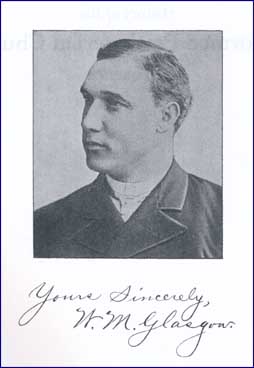A Great Historian & Biographer
When searching out pre-twentieth century Presbyterian biographies, there are three big names—three primary sources which cannot be overlooked. The unsurpassed efforts of William Buell Sprague would have to be mentioned first. Indeed, Sprague did not limit himself to Presbyterians, but gathered biographical entries covering all the major Protestant denominations and even included Unitarians in his nine volume set, Annals of the American Pulpit. (As a young man, Sprague came under the influence of a Unitarian teacher, but turned to orthodox Trinitarianism while attending Princeton Seminary).
Another resource is that of Alfred Nevin‘s Encyclopedia of the Presbyterian Church in the U.S.A., including the Northern and Southern Assemblies. This massive single volume was published in 1884 and tops out at 1229 pages. Where Sprague had solicited entries from pastors across the nation and acknowledges their contributions in each case, Nevin’s work gives the appearance of being his work alone, though it seems doubtful that a work of that extent could have been accomplished by just one man.
 The third major resource brings us to another great biographer and the focus of our post today. William Melancthon Glasgow was born in Northwood, Logan county, Ohio, on July 1, 1856. If you will remember, this was the original location of Geneva College, and so not surprisingly this was where William received his college education, graduating there in 1880. After a few years of employment in Boston, he then prepared for the ministry at the Allegheny Theological Seminary (now known as the Reformed Presbyterian Theological Seminary).
The third major resource brings us to another great biographer and the focus of our post today. William Melancthon Glasgow was born in Northwood, Logan county, Ohio, on July 1, 1856. If you will remember, this was the original location of Geneva College, and so not surprisingly this was where William received his college education, graduating there in 1880. After a few years of employment in Boston, he then prepared for the ministry at the Allegheny Theological Seminary (now known as the Reformed Presbyterian Theological Seminary).
Glasgow’s first published work, Catalogue of the Alumni of Geneva College, appeared in the same year that he began his Seminary studies (1882). Another work, History of Geneva College followed quickly (1883), and his third book, The Provincial Churches, was published around the time he graduated in 1884. Clearly he was already evidencing his life’s interest in history and biography. I know of no other seminary student who has ever equalled his record of three volumes published while still in seminary.
Glasgow was licensed to preach by the (Reformed Presbyterian) Presbytery of Pittsburgh on April 9, 1884 and later ordained by the Philadelphia Presbytery (also RP) on November 26, 1885. He was installed as the pastor of the RP church in Baltimore, Maryland, and served that church until the early summer of 1889. His second pastorate was in Kansas City, Missouri, 1889-1893 and from that post he next answered a call to serve the RP church in Beaver Falls, Pennysylvania. In 1899, he transferred his credentials into the United Presbyterian Church of North America, in order to take a call to serve the UPCNA church in Wellsville, Ohio, from 1899 until his death in 1909, at the age of 51.
 Rev. Glasgow authored two major works which are of inestimable value. The first of these, History of the Reformed Presbyterian Church in America, was published in 1888. That volume was republished in 2007 by Reformation Heritage Books. Glasgow’s other major biographical work was his Cyclopedic Manual of the United Presbyterian Church in North America, published in 1903. This work has never been republished, but is available in digital format. Where the former work offered more extensive biographies and histories of R.P. congregations, the latter U.P. work adopts a shorter notation style, similar in format to what is found today in the PCA Yearbook and the OPC Ministerial Register.
Rev. Glasgow authored two major works which are of inestimable value. The first of these, History of the Reformed Presbyterian Church in America, was published in 1888. That volume was republished in 2007 by Reformation Heritage Books. Glasgow’s other major biographical work was his Cyclopedic Manual of the United Presbyterian Church in North America, published in 1903. This work has never been republished, but is available in digital format. Where the former work offered more extensive biographies and histories of R.P. congregations, the latter U.P. work adopts a shorter notation style, similar in format to what is found today in the PCA Yearbook and the OPC Ministerial Register.
Words to Live By:
I’m convinced that the work of Christian biography and history falls very much within the Scriptural mandate to remember the Lord’s works [1 Chron. 16:9; Ps. 26:7; 28:5; 77:11; 78:7; 105:5; etc.] The history of the church is a history of what the Lord has done and is doing on this earth. Thus we can understand it as redemptive history, though clearly it is not authoritative or divinely inspired history, not in the way that Scripture is. We cannot look to church history or Christian biography to determine God’s will, for instance. But we can find profit from these accounts, and certainly these stories can prompt us to praise God.
Psalm 111:2-4 (KJV)
2. The works of the LORD are great, sought out of all them that have pleasure therein.
3. His work is honourable and glorious; and his righteousness endureth forever.
4. He hath made his wonderful works to be remembered; the LORD is gracious and full of compassion.
Tags: Geneva College, North America, United Presbyterian Church, William Melancthon Glasgow

No comments
Comments feed for this article